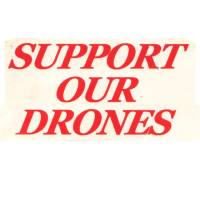Governor Brown Shoots Down Bill to Limit Warrantless Drones

Governor Jerry Brown says that he can envision situations where law enforcement agencies might need to get a warrant to operate surveillance drones, but he didn’t think state lawmakers had a handle on what those circumstances were.
It was better that policing agencies not be required to get warrants at all, so Brown vetoed Assembly Bill 1327. “The bill’s exceptions . . . appear to be narrow and could impose requirements beyond what is required by either the 4th Amendment or the privacy provisions in the California Constitution,” he wrote in his veto message (pdf).
While Brown thought the legislation too restrictive, some civil libertarians thought it too broad. For instance, the bill prohibits weaponizing the drones—“unless authorized by federal law.”
SB1327 required law enforcement agencies to get a warrant before using a drone except under certain circumstances. First on the list of waivers was for “an imminent threat to life or of great bodily harm.” That could be a fire, a hostage crisis, a hot pursuit, a search and rescue operation or any operation where law enforcement personnel are in danger.
No warrant was necessary in an “imminent or existing” environmental emergency, “including, but not limited to, oils spills or chemical spills.” Drones could be rushed to the scene without a warrant “to assess the necessity of first responders in situations relating to traffic accidents.”
Law enforcement also would have been allowed to use drones without a warrant “to inspect state parks and wilderness areas for ‘illegal vegetation.’ ” That could be a reference to tumbleweeds, but is probably about marijuana.
The information collected by drones would have to be made available for disclosure—unless it wasn’t. An agency could withhold release if doing so would interfere with an investigation.
The legislation required public agencies to let the public known when it buys drones. They also would have had to destroy most drone-collected information within a year and couldn’t put weapons on their flying bots unless the federal government said they could.
The bill’s author, Assemblyman Jeff Gorell (R-Camarillo), told the Los Angeles Times he was not happy. “We're increasingly living in a surveillance society as the government uses new technology to track and watch the activities of Americans. It's disappointing that the governor decided to side with law enforcement in this case over the privacy interests of California.”
He also tweeted, “The era of govt. surveillance continues.”
–Ken Broder
To Learn More:
California Governor Vetoes Drone Warrant Bill (by Curtis Skinner, Reuters)
Governor Vetoes Bill that Would Have Limited Police Use of Drones (by Phil Willon and Melanie Mason, Los Angeles Times)
San Jose Police Sort of Apologize for Sneaking in a Drone without Public Approval (by Ken Broder, AllGov California)
- Top Stories
- Controversies
- Where is the Money Going?
- California and the Nation
- Appointments and Resignations
- Unusual News
- Latest News
- California Forbids U.S. Immigration Agents from Pretending to be Police
- California Lawmakers Urged to Strip “Self-Dealing” Tax Board of Its Duties
- Big Oil’s Grip on California
- Santa Cruz Police See Homeland Security Betrayal in Use of Gang Roundup as Cover for Immigration Raid
- Oil Companies Face Deadline to Stop Polluting California Groundwater





